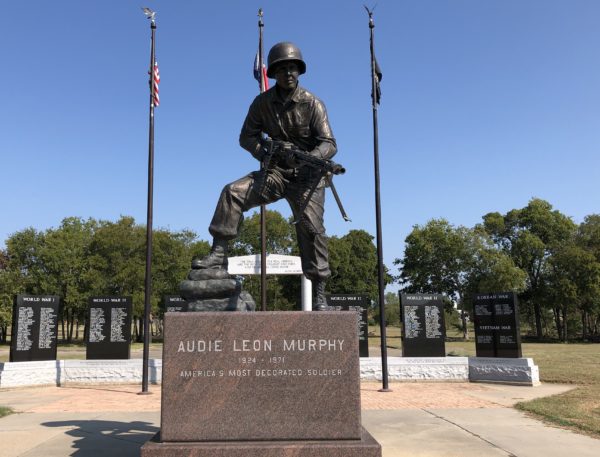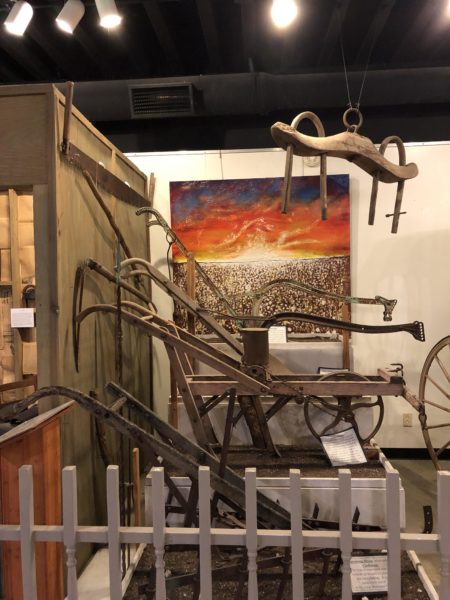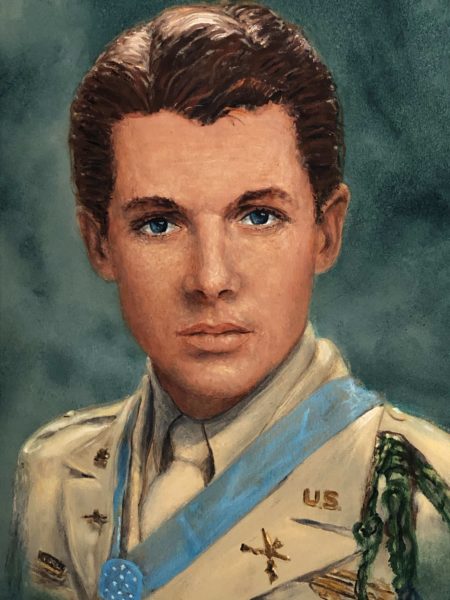
What do a World War II hero, Hunt County, and cotton have in common? They are the focal points of exhibits at Greenville’s Audie Murphy/American Cotton Museum.
I confess. I’m drawn to a town’s heritage museum. Texas towns, like Greenville, offer day-trippers antique shops, boutiques, and interesting cafes – all a superficial experience of the town today. Visit the city’s heritage museum to go beyond the surface, to find the depth of personality and history each of these fabulous towns possess.
Audie Murphy/American Cotton Museum
The museum is on the Interstate 30 access road. The military memorial at the entrance signals the community’s commitment to tell Audie Murphy and other veterans’ stories. As you drive up to the museum, you pass historic buildings, often open for events like Frontier Day (held the first Saturday in November). The museum plans to operate a Blacksmith shop on premise – a fun, upcoming addition. Inside, the museum is loosely divided into three sections: Hunt County history, Cotton, and Audie Murphy.
Hunt County history
The area’s history begins with the Caddo and Shawnee, the indigenous people of the region. More could be done to expand this section as you quickly move into European settlement beginning in 1830. County notables, like White Sox pitcher Monty Stratton; diplomat, Fletcher Warren; and middleweight boxing champion, Reecy Davis all retain their own museum display. I found the street front exhibit enlightening. Combining visual display with audio storytelling, you gain an appreciation of the lifestyle and issues of 1920 Greenville.
Cotton

I think of this region as as a cattle and then oil center. But, from about 1850 through 1920, cotton was king with cotton mills in McKinney, Greenville, and other East Texas towns. The railroad allowed places like Greenville a means to move large quantities of cotton. In fact Greenville had the largest cotton press in the world in 1911. Much of the cotton was raised and harvested by sharecroppers and sales managed by cotton brokers. The Depression and decline in the cotton industry, heralded hard times for many of these cotton-dependent towns. Farmers, both white and black, became part of the Great Migration north. By 1950, over six million southerners left rural life for jobs in northern factories. The museum provides good background of the cotton tale — how it was produced, milled, and sold.
Audie Murphy

The last section of the museum is devoted to Audie Murphy and other local veterans. Murphy is a fascinating man. He was born in 1924, the third son of seven children. Murphy’s father was a tenant/sharecropper farmer, requiring the family to move frequently for work. In 1940, his father abandoned the family. Audie, for his part, worked from age 14. From these humble beginnings, Audie Murphy became a World War II hero, earning every combat medal, including the Medal of Honor, by age twenty-one. After the war, he wrote his memoir To Hell and Back, which later became a movie, starring, you guessed it, Audie Murphy. He continued his Hollywood career acting alongside greats like Jimmy Stewart.
Despite his talents and success, Murphy suffered from what we now know as PTSD (post-traumatic stress disorder). The museum speaks to the combat fatigue he battled. I was particularly struck by Murphy’s words: “After the war, they took the Army dogs and rehabilitated them for civilian life. But they turned soldiers into civilians immediately and let them sink or swim.”
When you go
Audie Murphy/American Cotton Museum (600 I-30 East, Greenville) is open Tuesday through Saturday from 10 am to 5 pm. Admission is $6, with discounts for seniors, veterans, and students. Be sure to visit the museum website to learn about special events like Frontier Days, brown bag lectures, and golden oldie movie nights.
Quote from Greenville Military Monument: “No man is entitled to the blessings of freedom unless he be vigilant in its preservation” –General Douglas MacArthur
 Copyright secured by Digiprove © 2019
Copyright secured by Digiprove © 2019 
